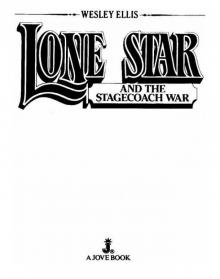- Home
- Wesley Ellis
The Stagecoach War
The Stagecoach War Read online
Table of Contents
Title Page
Copyright Page
Chapter 1
Chapter 2
Chapter 3
Chapter 4
Chapter 5
Chapter 6
Chapter 7
Chapter 8
Chapter 9
Chapter 10
Chapter 11
Chapter 12
Chapter 13
Chapter 14
Chapter 15
Chapter 16
Teaser chapter
STAGECOACH TO HELL!
Austin Higby waited until the coaches were just twenty yards apart and thundering toward each other. Suddenly, he pulled hard on the lines and sent the lead horses into a sharp turn. The wheel horses tried to follow, but the Concord coach went into a skid and hit the exact rock that Higby had aimed for. The oaken spokes of the right back wheel shattered, and the Concord crashed over on its side with the sickening sound of splintering wood and twisting metal.
Jessie cried out as she felt herself being hurled into the sky. Beside her, Ki was launched off the stagecoach, too. He heard a tremendous crack as the Concord coach broke apart.
A scream filled the air ...
Also in the LONE STAR series from Jove
LONGARM AND THE LONE STAR LEGEND
LONE STAR ON THE TREACHERY TRAIL
LONGARM AND THE LONE STAR VENGEANCE
LONGARM AND THE LONE STAR BOUNTY
LONE STAR AND THE HANGROPE HERITAGE
LONE STAR AND THE MONTANA TROUBLES
LONE STAR AND THE MOUNTAIN MAN
LONE STAR AND THE STOCKYARD SHOWDOWN
LONE STAR AND THE RIVERBOAT GAMBLERS
LONE STAR AND THE MESCALERO OUTLAWS
LONE STAR AND THE AMARILLO RIFLES
LONE STAR AND THE SCHOOL FOR OUTLAWS
LONE STAR ON THE TREASURE RIVER
LONE STAR AND THE MOON TRAIL FEUD
LONE STAR AND THE GOLDEN MESA
LONGARM AND THE LONE STAR RESCUE
LONE STAR AND THE RIO GRANDE BANDITS
LONE STAR AND THE BUFFALO HUNTERS
LONE STAR AND THE BIGGEST GUN IN THE WEST
LONE STAR AND THE APACHE WARRIOR
LONE STAR AND THE GOLD MINE WAR
LONE STAR AND THE CALIFORNIA OIL WAR
LONE STAR AND THE ALASKAN GUNS
LONE STAR AND THE WHITE RIVER CURSE
LONGARM AND THE LONE STAR DELIVERANCE
LONE STAR AND THE TOMBSTONE GAMBLE
LONE STAR AND THE TIMBERLAND TERROR
LONE STAR IN THE CHEROKEE STRIP
LONE STAR AND THE OREGON RAIL SABOTAGE
LONE STAR AND THE MISSION WAR
LONE STAR AND THE GUNPOWDER CURE
LONGARM AND THE LONE STAR SHOWDOWN
LONE STAR AND THE LAND BARONS
LONE STAR AND THE GULF PIRATES
LONE STAR AND THE INDIAN REBELLION
LONE STAR AND THE NEVADA MUSTANGS
LONE STAR AND THE CON MAN’S RANSOM
LONE STAR AND THE STAGECOACH WAR
A Jove Book published by arrangement with
the author
PRINTING HISTORY
Jove edition/January 1987
All rights reserved.
Copyright © 1987 by Jove Publications, Inc.
This book may not be reproduced in whole or in part,
by mimeograph or any other means, without permission.
For information address: The Berkley Publishing Group,
200 Madison Avenue, New York, N.Y. 10016.
eISBN : 978-1-101-16991-9
Jove Books are published by the Berkley Publishing Group,
200 Madison Avenue, New York, N.Y 10016. The words
“A JOVE BOOK” and the “J” with sunburst are trademarks
belonging to Jove Publications, Inc.
http://us.penguingroup.com
Chapter 1
Jessica Starbuck and Ki walked purposefully through San Francisco’s teeming Chinatown. It was a bright, sunny day, and in the distance they could see the Pacific Ocean dotted with sailing ships and fishing boats. The salty taste of the sea was as sharp as the fragrance of Chinese herbs and spices that bubbled in cooking pots. The streets were packed with vendors selling everything from incense to plucked chickens and Chinese fans. Down near the water-front, raucous swarms of gulls fought noisily around the wharves, seeking the offal of the day’s catch. As Jessie and Ki walked along, they attracted considerable attention from the rough European and American seamen who came in search of the delicate Chinese prostitutes who peddled opium as well as their bodies.
Jessie never failed to catch the eye, because she was tall, lithe, and lovely. The sea breeze riffled her long, copper-colored hair and made it sparkle in the sun. Jessie was in her twenties, long-legged with high, full breasts that accentuated her narrow waist. She greatly preferred to wear tight denim jeans and a wrangler jacket, but today she had an important business meeting with the Starbuck people about her shipping enterprises and had dressed conservatively. Because of this, no one mistook her for one of the white prostitutes who occasionally dared to enter the rougher sections of Chinatown in hopes of attracting the eye of a wealthy Oriental street merchant. One look at Jessie and the men who watched knew that here was a lady born and bred of high station, and one who could take care of herself and satisfy any man.
The older Chinese with hands strained by the opium pipe and inscrutable faces wrinkled like dried prunes paid particular attention to Ki. They knew at once that he was not even a little Chinese, for his eyes were too round, his cheeks too full, and his shoulders and body much too large. They correctly judged Ki to be half Japanese, half Caucasian. The Chinese hated the Japanese, for they had once invaded and conquered their mainland and were therefore considered to be enemies and a heathen people little more refined than the whites. But though they were heathen, the Japanese were feared and respected, and Ki had the look of a man skilled in the martial arts. The old Chinese looked away and the younger ones grudgingly stepped aside.
“They don’t like you, do they?” Jessie asked, noticing the unfriendly looks thrown in Ki’s direction and how the younger men faintly challenged him before stepping aside.
“No,” Ki answered, “they will never forgive my mother’s people for invading their lands. The idea of a small island people conquering the ancient armies of China is unthinkable to them, and yet it did happen. I understand their dislike. Once, I tried to explain to a Chinaman who spoke English that such historical things do not matter in this country and time. He refused to listen and we parted badly. He told me that all Chinese will forever distrust and dislike all Japanese. I fear this is the truth, for I remember how my samurai teacher, Hirata, spoke of the hatred of the Chinese. Yet he taught me something of their ways of fighting and thinking.”
Jessie glanced sideways at Ki. He was not a good deal taller than she was, and yet she had seen him demolish men almost twice his weight simply by the use of his lethal hands and feet. In a time and country where most white men looked upon anyone even half Oriental with unconcealed disgust, Ki was always greatly underestimated and often forced to defend his manhood. He had never failed to emerge victorious from such confrontations, and many was the time he had saved Jessie’s life from men who thought a rich young woman was also easy prey.
They were now deep into the roughest section of Chinatown, and Jessie saw hard-looking groups of Chinese men staring at them. “We shouldn’t have come this way,” she said.
“We’ll soon be out of here. Besides, it was the shortest route to your meeting,” Ki said with a slight shrug of his broad shoulders. He was a handsome man, clean-shaven except for a thin mustache. His hair was black and longis
h and he wore a braided leather headband to keep it in place. His clothes were of the western style but, unlike most westerners, Ki wore no hat and preferred soft rope sandals to heavy boots. Ki moved with more natural grace than any man Jessie had ever known. He was as smooth-muscled as a cat and every bit as quick and dangerous.
“I know that,” she said impatiently. Jessie carried a shoulder purse and inside of it was a gun that, when absolutely necessary, she could use as effectively as a riverboat gambler. “I just had forgotten how tough this neighborhood was.”
Ki was thinking the same thing, although he did not want to admit it to Jessie and unduly alarm her. Had it been nighttime, they would already have been set upon by one of the tongs of Chinatown that murdered with ruthless efficiency. In daytime, however, there was some safety if they kept moving fast and stayed close to the center of the crowded street and away from the narrow, cluttered alleys where opium users and murderers lurked in wait.
Ki felt the presence of danger before he saw it. They still had two short blocks to go when suddenly, the street cleared and ahead of them stood three exceptionally large men dressed completely in black. These were not the thin, sallow-faced youths who had been watching them up to now, but chosen tong assassins who ruled the streets of Chinatown. Ki touched Jessie’s arm and stepped in front of her as the street people melted into the background.
Jessie slipped her hand inside her purse and started to pull out her gun, but Ki said, “If you open fire, they’ll have friends who will do the same. We’re surrounded, and the best thing we can do is keep walking forward, hit them hard and fast, then keep moving.”
“All right,” Jessie said, eyeing the huge tong warriors who stood like three blocks of stone in their path, “but I still think that...”
Her words died in her mouth as one of the Chinamen snarled, “Far enough! You givee money, nicee easy.”
Ki lifted his hands palms up and smiled disarmingly. “I have no money,” he said, still moving toward the three menacing figures.
“She havee money, you givee now!”
“I’ll give you all I can,” Ki said, moving forward so suddenly that he caught the big Chinaman standing flat-footed with a sweep lotus that caught the tong warrior in the throat and broke his larynx, dropping him strangling to his knees.
The other two men drew long swords but, before they were halfway drawn, Ki attacked with cold efficiency. The edge of his hand was like a blade as he used its iron-hard muscles to smash a second Chinaman across the side of the jaw and send him reeling. The third assassin did manage to get his killing sword out and take a swipe at Ki, but he was able to leap back out of the way enough to avoid the singing steel.
“Start moving,” Ki hissed to Jessie as he and the Chinese tong warrior began to circle each other warily. “Once you go, don’t look back and don’t stop running!”
“Like hell I will,” Jessie said, her green eyes scanning the crowd of Chinese who watched. She was searching for others who would interfere once Ki disabled the last Chinaman. “Just finish him off and let’s get out of here!”
The deadly sword swished again with such suddenness that it was merely a silver blur to the eye. “I’m trying,” Ki said between clenched teeth as he feinted a foot strike that drew another sword swing.
Ki pretended to lose his balance for a moment and the Chinaman leapt forward with his killing sword lifted high for the finishing blow. Jessie’s breath caught in her throat for an instant as she herself was fooled. But as the sword came down, Ki moved with incredible swiftness and came in under the Chinaman’s powerful arms. Ki used a brutal knife-hand punch that landed just under the warrior’s chin and lifted him completely off the ground. He then drove his stiffened fingers to the man’s solar plexus, and Jessie saw the blood drain from the larger man’s face. Ki finished the assassin off with a hip throw that smashed his opponent down to the street and knocked him unconscious.
A vicious snarl spun Jessie around just as the second assassin recovered enough to hurl a knife at Ki. “Look out!” she cried.
Ki dropped to the earth and the knife whistled past his ear. When the Chinaman reached into his loose-fitting black outfit and pulled a gun, Jessie beat him to the draw and her own weapon bucked in her fist. The Chinaman’s shoulder erupted with a crimson blossom and the man screamed and fled.
“Let’s get out of here!” Ki yelled as he leapt to his feet and grabbed Jessie.
Jessie wasn’t about to argue. She held Ki’s hand and together they darted up the narrow street, scattering Chinese in their path. Once, a rapid popping sound not unlike Chinese firecrackers swept the street behind them. But Jessie knew they weren’t firecrackers when she saw a piece of wood splinter off a vendor’s wagon.
A few breathless moments later they were out of Chinatown and striding up a steep hill into San Francisco’s financial district, where bankers and businessmen awaited the daughter of Alex Starbuck.
At the huge stone entrance to the Bank of San Francisco, they halted to catch their breath and straighten their clothing. Jessie arranged her hair with a comb made of ivory and said, “Do I look presentable?”
“Yes,” Ki answered, brushing a single errant tendril of her hair back into place. “Every inch the daughter of Alex Starbuck.”
“Good.” His answer pleased her very much, because the bankers she was about to meet with had revered her father. Alex Starbuck was a legend in San Francisco as well as around the world. His far-flung enterprises straddled the globe, but it was here he had gotten his start selling secondhand merchandise and a few well-chosen articles of real value that he had bought in the Far East.
Alex Starbuck had possessed a genius for making money and his import business had blossomed overnight. He had soon purchased a battered ship to carry trade goods from Japan and China to the United States. Ownership of another seagoing vessel quickly followed and then more. Other shipping lines had tried to crush the new upstart, but Alex had demonstrated a ruthless ability and determination to protect his own interests. Soon he had operated an entire fleet of trading vessels. Not satisfied with the work of other shipbuilders, Alex Starbuck had become a shipbuilder without peer and had been one of the first innovators to switch from the rotting wood hulls to those made of steel.
Steel was the future and Alex had bought mines in many parts of the world and then mills to refine it into the stuff that would make his merchant fleets the finest sailing any sea. The man had branched into many other enterprises. His steel had helped build locomotives and thousands of miles of railroad track. Soon, Alex was helping design better train engines and buying stock in America’s railroads. As his empire grew, the need for ready cash had sent him into the banking business. He had helped establish the Bank of San Francisco and covered its early, formative years with his wealth, power, and prestige. He bought and sold real estate, dabbled in South American diamond mines, and helped finance democracies friendly to private enterprise. When he had died, it had taken accountants two years to get an idea of the amount of the Starbuck wealth. After the figures had climbed over ten million dollars, Jessie had lost count.
Like her father, Jessie’s real love was the Circle Star Ranch in Texas, but she had inherited Alex’s flair and financial ability. She had kept control over his empire with an efficiency that belied the rumors that she was just beautiful. The men she was about to meet with respected not only her power and wealth but also her ability, and she was proud of that. Jessie liked to deal with men on an equal footing in both the boardrooms of America’s greatest companies and the bedrooms of cabins and palaces. Unconventional, sure. But just being a woman with so much power and influence was unconventional, so none of it mattered to her except trying to be the best, like her father had been before he was murdered by a vicious cartel that she and Ki had since smashed. Alex Starbuck was gone, but powerful bankers like those inside who awaited her would never forget the Starbuck name and legend.
The Bank of San Francisco was opulent and reflected both the F
orty-Niner gold rush and the huge wealth that still flowed westward from the Comstock Lode in Nevada. The floors were solid marble and the wood counters and railings were of carved and polished teak and mahogany. Each of the bank officers had magnificent oak desks with plush swivel chairs. All eyes turned to Jessie and Ki when they entered. A young man who had been stationed specifically to greet her rushed forward with an outstretched hand.
“Miss Starbuck, what a pleasure to see you again after such a long time! How long has it been?”
“About six months, Norman.”
“At least that long. Texas’s gain is California’s loss.” He turned to Ki and greeted him with almost as much respect, because he knew how important the martial-arts master was to Jessie. “Ki, you’ve never looked more fit.”
Ki just smiled and said nothing. He knew that he was being flattered because of his boss, and that had it not been for Jessie, he would not even have been allowed into the bank, which discouraged having working-class men and Orientals for customers. Someday that would probably change, but at present the Bank of San Francisco was very discriminating in its choice of clientele.

 The Mission War
The Mission War The Stagecoach War
The Stagecoach War The Railroad War
The Railroad War